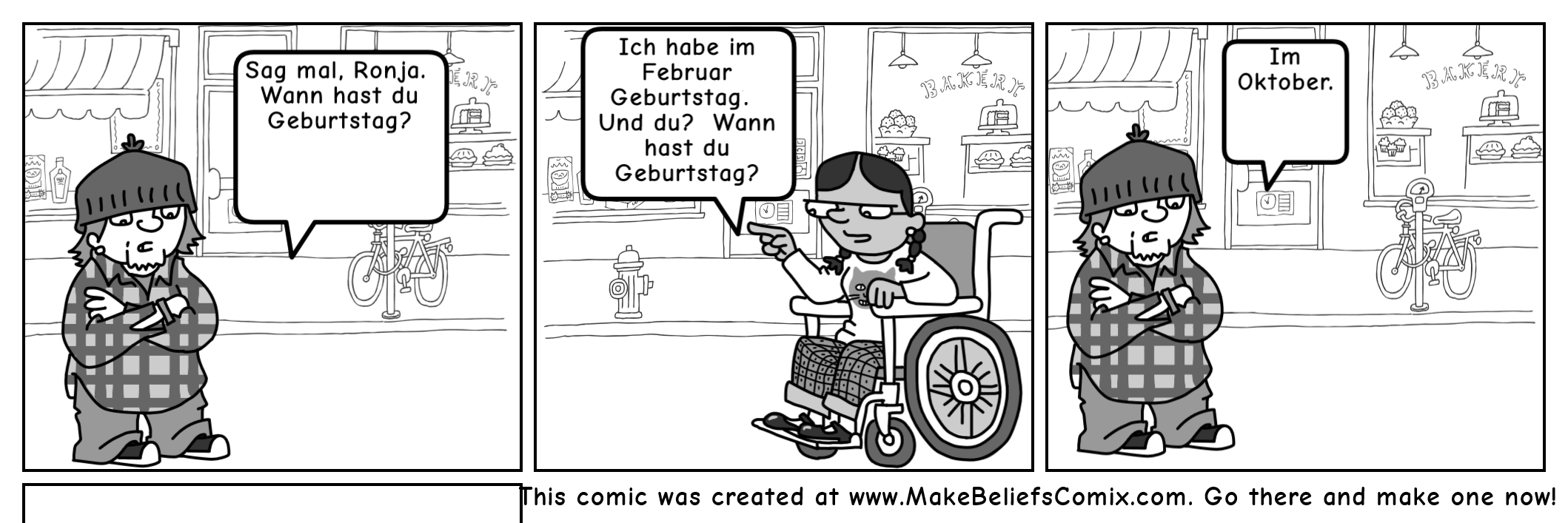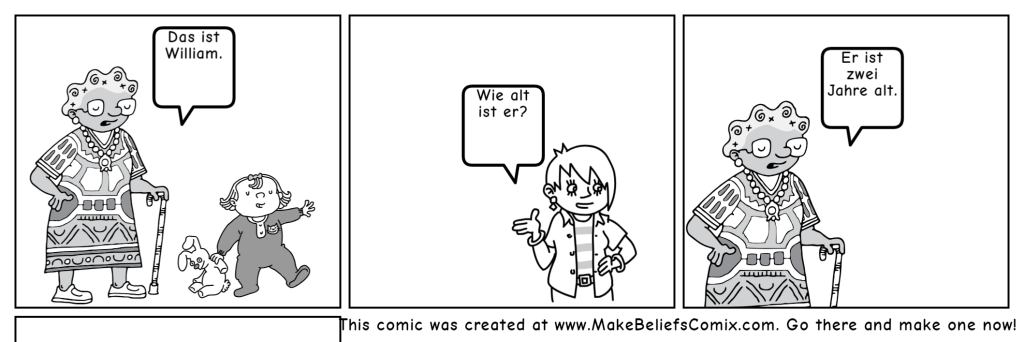1.3 Wie alt bist du?

Moin!
Let’s warm up with our daily small talk (Tagesminiplausch) and a brief review (Wiederholung).
Wiederholung
In the previous lesson, you practiced saying and understanding the spelling names with both the standard alphabet and the Buchstabieralphabet. Let’s review what you have learned.
Jetzt bist du dran!
In your audio journal, spell your name and the name of a friend, family member, or classmate aloud.
Lektionsüberblick
In this lesson, we will learn how to 1) be comfortable with positive numbers. 2) understand the question “Wann hast du Geburtstag?”, 3) say your birthdate, and 4) ask how old someone is.
Was weißt du schon?
In order to complete today’s lesson, you should already know how to say numbers that could be an age or date as well as the months of the years (die Monate des Jahres). Check your skill level with the activities below. You should be able to complete these activities comfortably before moving on. A link to review is provided after the activities.
| Noch nicht start klar?
Du kannst immer auf die gleiche 1010-Lektion zurückgreifen! |
Not confident about starting this lesson?
You can always review the same Lektion from 1010. |
1) Be comfortable with numbers
Watch the video below to strengthen your knowledge, particularly of the numbers over 12. Pay close attention to numbers like your birthdate, your age, and the age and birthdate of someone you care about.
Kleiner Hinweis
When talking with someone on the phone in German, sometimes it is difficult to distinguish between when someone is saying the number two (zwei) or three (drei). They can sound similar. For that reason, sometimes German speakers will say zwo instead of zwei on the telephone or when someone is otherwise trying to explicitly differentiate the number zwei from drei. Can you hear the difference?
| eins – zwei – drei | eins – zwo – drei |
2) Wann hast du Geburtstag?
Read and listen to the conversation below.
 |
||
3) How to say your birthdate
Read and listen to Julia, Max, and Yasmin give their birthdays.
 |
Ich habe am 3. März 1998 Geburtstag. | |
 |
Ich wurde am 23. Oktober geboren. | |
 |
Ich habe am fünfzehnten Januar Geburtstag. |
It is important to note that Julia, Max, and Yasmin are using ordinal numbers just like we do in English (e.g. I was born on January 15th. Her birthday is on the second of April.). The same holds true for German. Below are some examples of Ordinalzahlen.
| 1st | erste |
| 2nd | zweite |
| 3rd | dritte |
| 4th | vierte |
| 5th | fünfte |
| 6th | sechste |
| 7th | siebte |
| 8th | achte |
| 9th | neunte |
| 10th | elfte |
| 12th | zwölfte |
| 27th | siebenundzwanzigste |
🎥 You can listen to this episode of Coffee Break German to hear how people say their birthday (or birth month).
Berlin im Blickpunkt

Das größte Kaufhaus in Europa (außerhalb von England) ist das KaDeWe in Berlin.
Es hat ungefähr 60.000 Quadratmeter Verkaufsfläche. Das Kaufhaus wurde 1907 geöffnet und ist heute ein bekanntes Symbol von Berlin. Am berühmtesten ist die Feinschmecker-Etage. Sie ist eine der größten in der Welt.
The largest department store in Europe (outside of England) is the KaDeWe in Berlin. It has approximately 60,000 square meters of retail space. The store opened in 1907 and is now a well-known symbol of Berlin. Its most famous feature is its gourmet floor, one of the largest in the world.
Jetzt bist du dran!
4) How to ask how old someone is
Read the short conversation below.

Jetzt bist du dran!
Zum Schluß
*As you conclude this lesson, don’t forget to check Canvas!*
Want extra practice with the numbers? Check out these additional resources:

Media Attributions
Deutsche Zahlen Von 1 Bis 100 by Deutsch lernen in Deutschland, licensed by CC-BY International License.
Media Attributions
- Geburtstag comic from German 101 Copyright © 2022 by Rebecca Linam, licensed under a Creative Commons Attribution 4.0 International License
- Image of Julia from Grenzenlos Deutsch, licensed under a Creative Commons Attribution-NonCommercial-ShareAlike 4.0 International License
- Image of Max from Grenzenlos Deutsch, GD Max.pgn_-211×300, licensed under a Creative Commons Attribution-NonCommercial-ShareAlike 4.0 International License.
- Image of Yasmin from Grenzenlos Deutsch, GD Yasmin-223×300, licensed under a Creative Commons Attribution-NonCommercial-ShareAlike 4.0 International License.
- Photo of KaDeWe, Jörg Zägel, Wikipedia, CC BY-SA 3.0
- Comic – Wie alt ist er? made at www.MakeBeliefsComix.com


